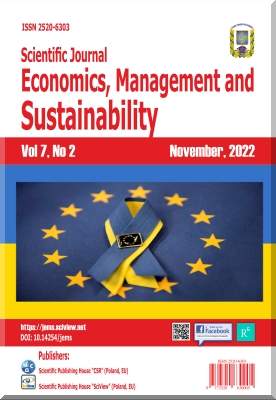Strengthening gender equality in small business and achieving sustainable development goals (SDGs): Comparative analysis of Kenya and Nigeria
Strengthening gender equality in small business and achieving sustainable development goals (SDGs): Comparative analysis of Kenya and Nigeria
Author(s): Bolaji Jubril, Timilehin Olasoji Olubiyi, Oluwaseun Samson Sojinu, Rosemary NgariSubject(s): Gender Studies, Business Ethics, Socio-Economic Research
Published by: Scientific Publishing House "SciView"
Keywords: Africa; development; entrepreneur; entrepreneurial gap; gender parity; poverty alleviation;
Summary/Abstract: Many small business owners and entrepreneurs in Africa still see sustainable development goals as a misery. The study investigates whether sustainable development goal number five (5) is being used to motivate gender equality among small and medium-sized enterprises in Africa, particularly in Kenya and Nigeria. The study focuses on female entrepreneurs and female-owned businesses. Design/methodology/approach. A qualitative approach involving semi-structured in-depth interviews was considered with a target population of 110 participants selected from businesses operating in Embakasi East constituency in the Embakasi ward in Nairobi County, Kenya, and in Ikeja Local Government in the Lagos Mainland of Lagos state Nigeria. The primary interview data was gathered from businesses in the manufacturing, services, information technology, transport, trading, and communications sectors. Findings. From the population of 110 participants, the response rate was 90.91%. Results demonstrated that a significant number of women working in SMEs are unaware of the sustainable development goal number five (5) in the two countries despite the United Nations (UN) supporting gender equality globally. The research concludes that there is still a considerable difference between men and women in small and medium-sized SMEs in Africa, and the awareness of sustainable development goals is limited. Research limitations/implications. The restriction of the dataset from a small sample size of women-owned businesses operating in Embakasi East constituency in the Embakasi ward in Nairobi County, Kenya, and in Ikeja Local Government in the Lagos State Nigeria. The research criteria used to choose study participants were unique to the current research; future researchers may consider changing the research criteria and sample size to broaden the study's focus. Practical implications. The study advances empirical research on sustainable development goal number five (5) by offering evidence of its impact on women-owned businesses. Further, the study throws light on the need to the fact that gender equality is necessary and why women should receive funding and mentoring to help them succeed as business owners. Originality/value. The study provides a comparative study with evidence from two countries, Kenya and Nigeria, on sustainable development goal number five (5) and throws light on the relevance of gender equality on business performance as funding and mentoring will assist women-owned businesses. For Africa to flourish and grow economically, gender equality is crucial.
Journal: Economics, Management and Sustainability
- Issue Year: 7/2022
- Issue No: 2
- Page Range: 19-31
- Page Count: 13
- Language: English

